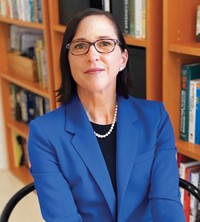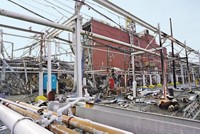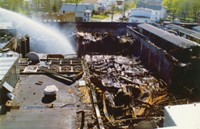Advertisement
Grab your lab coat. Let's get started
Welcome!
Welcome!
Create an account below to get 6 C&EN articles per month, receive newsletters and more - all free.
It seems this is your first time logging in online. Please enter the following information to continue.
As an ACS member you automatically get access to this site. All we need is few more details to create your reading experience.
Not you? Sign in with a different account.
Not you? Sign in with a different account.
ERROR 1
ERROR 1
ERROR 2
ERROR 2
ERROR 2
ERROR 2
ERROR 2
Password and Confirm password must match.
If you have an ACS member number, please enter it here so we can link this account to your membership. (optional)
ERROR 2
ACS values your privacy. By submitting your information, you are gaining access to C&EN and subscribing to our weekly newsletter. We use the information you provide to make your reading experience better, and we will never sell your data to third party members.
Safety
Long-Serving Chemical Safety Board Member Dies
Plant Safety: Irv Rosenthal was a chemical industry safety advocate and one of first CSB members
by Jeff Johnson
February 15, 2013
Isadore “Irv” Rosenthal, one of the original Chemical Safety & Hazard Investigation Board (CSB) members and a prominent chemical industry safety expert, died Feb. 10. The cause of death was pneumonia.
Rosenthal, 87, was appointed to the board by President Bill Clinton in 1998, the first year the board began operating. The independent, five-member board is charged with investigating the root cause of chemical accidents. Rosenthal served on the board until 2003. He had a pioneering influence on the development and growth of the CSB. With broad safety experience, technical industry knowledge, and humor, he helped guide the board in its early years.
He came to the board after 38 years with Rohm and Haas, a Philadelphia-based chemical company. Rosenthal worked on a variety of research and development activities and new business ventures and held corporate staff positions. On the corporate level, he served as director of safety, health, environmental affairs and product integrity.
With detailed technical knowledge of chemical process operations, he was highly respected by CSB staff members, many of whom viewed him as a mentor in the field of root cause accident investigations and the development of safety recommendations.
Perhaps Rosenthal is best remembered for his work on the safety board’s review of hazards associated with reactive chemicals and the production of a landmark reactives safety study in 2002. Among this report’s recommendations, the board called on the Occupational Safety & Health Administration and the Environmental Protection Agency to widen their process safety and risk management standards to achieve more comprehensive control of reactive hazards that have led to catastrophic consequences in the workplace.
Additionally, Rosenthal urged industry and the government to improve the quality and quantity of their accident data, persuading EPA to improve its risk management plan reporting requirements, and successfully urging CSB to develop and improve its own incident screening procedures.
Born June 10, 1925, in New York City, Rosenthal was educated at New York University, Purdue University, and Pennsylvania State University, where he earned a doctorate in physical chemistry.
Rosenthal also served on the Independent Safety Review Panel headed by former Secretary of State James Baker III, which examined the 2005 accident at the BP Texas City, Texas, refinery that killed 15 workers. The BP-funded panel, a CSB recommendation, was created to look into the corporation’s overall safety culture. Rosenthal, who had was no longer a CSB member, was one of two representative selected by the United Steelworkers (USW) for the panel.
“Irv was a real hero on the Baker panel,” said Michael J. Wright, USW director of health, safety, and the environment. “His work had a lot to do with the quality of the final report. Before that, he took on the difficult job of reforming health and safety at Rohm and Haas, and did it superbly. When we needed a consultant after the Texas City explosion, he was our first choice. A lot of my union colleagues were skeptical about recommending a ‘company guy,’ but he proved to be just as pro-union and pro-worker as we were.”
After Rosenthal’s retirement from Rohm and Haas, he joined the Wharton Risk Management & Decisions Processes Center as a senior research fellow, focusing on the management of risks associated with low probability-high consequence industrial accidents, market-based alternatives to government regulation of industrial risks, and the methodology of risk assessment.
He returned to Wharton after his CSB term was over.
In a statement, CSB noted: “In academia, in industry, and at the Chemical Safety Board, Dr. Rosenthal devoted his broad intellect and boundless energy to a singular cause: preventing accidents and saving lives. We are grateful for his service.”
He is survived by four children and nine stepchildren.





Join the conversation
Contact the reporter
Submit a Letter to the Editor for publication
Engage with us on Twitter